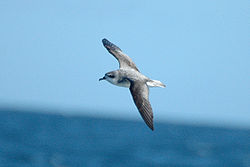- Cook's Petrel
-
Cook's Petrel 
Conservation status Scientific classification Kingdom: Animalia Phylum: Chordata Class: Aves Order: Procellariiformes Family: Procellariidae Genus: Pterodroma Species: P. cookii Binomial name Pterodroma cookii
(G.R. Gray, 1843)Cook's Petrel (Pterodroma cookii), one of the smallest petrels, is a species of seabird and a member of the gadfly petrels. The bird is 25-30 cm in size, with a 65-66 cm wingspan.
This species is highly pelagic except to nest and rear young. The bird's breeding takes place on offshore islands, forest ridges, or steep slopes. The Cook’s Petrel breeds only in New Zealand on three small islands: Little Barrier, Great Barrier and Codfish Islands. It migrates to the Pacific Ocean from New Zealand when it is not breeding. It sometimes can be seen well off the west coast of the United States and well off the west coast of tropical South America. Cook's Petrel feeds on mostly fish and squid, with some crustaceans taken.
The Cook’s Petrel has some unique features. The nose of the Cook’s Petrel is long and black with tubular nostrils on both sides. This enables these birds to have an exceptionally acute sense of smell, used to locate food and nest sites in the dark. However, it is also similar to the Westland Pretel species.
Cook's Petrel use burrows and rock crevices to nest in. It prefers thickly forested ridges. It was formerly more numerous than today. The current estimate of the Cook’s Petrel population is 1,258,000. However, this population is decreasing. This bird is classified as vulnerable because it only breeds on three small islands. While one island's population remains steady the other two are decreasing. One of these islands has introduced rats and Wekas, a small ground dwelling rail. These animals decreased the population from 20,000 to 100 by feeding on birds and eggs. On the third island, pigs, dogs, rats and cats have been introduced. They have attacked nests and burrows, decreasing the population that was supposed to grow.
References
[1] Rayner, Matthew. 7 July 2007 "Cook’s Petrel - Pterodroma Cookii." ARKive - Discover the World's Most Endangered Species. Web. <http://www.arkive.org/cooks-petrel/pterodroma-cookii/#text=FactsStatus>.
- BirdLife International (2004). Pterodroma cookii. 2006. IUCN Red List of Threatened Species. IUCN 2006. www.iucnredlist.org. Retrieved on 11 May 2006. Database entry includes a brief justification of why this species is endangered,and the criteria used
- "National Geographic" Field Guide to the Birds of North America ISBN 0-7922-6877-6
- Seabirds, an Identification Guide by Peter Harrison, ISBN 0-3956-0291-2
- Handbook of the Birds of the World Vol 1, Josep del Hoyo editor, ISBN 84-87334-10-5
- "National Audubon Society" The Sibley Guide to Birds, by David Allen Sibley, ISBN 0-679-45122-6
External links

This Procellariiformes-related article is a stub. You can help Wikipedia by expanding it.


